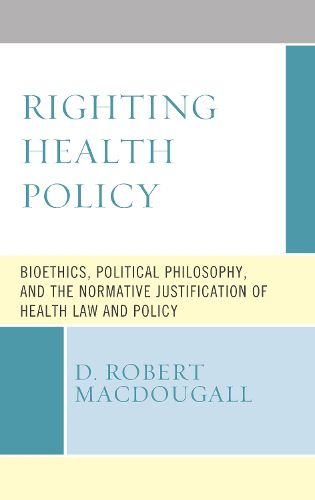Readings Newsletter
Become a Readings Member to make your shopping experience even easier.
Sign in or sign up for free!
You’re not far away from qualifying for FREE standard shipping within Australia
You’ve qualified for FREE standard shipping within Australia
The cart is loading…






In Righting Health Policy: Bioethics, Political Philosophy, and the Normative Justification of Health Law and Policy, D. Robert MacDougall argues that bioethics does not have adequate tools for justifying its normative recommendations for law and policy. Bioethics’ tools are mostly theories about what we owe each other. But justifying laws and policies requires more; at a minimum, it requires explaining the basis on which we may control or influence others to do what they are supposed to do, which lies within the realm of political and not moral philosophy.
MacDougall develops an interpretation of Kant’s moral and political philosophy and uses this account to show the importance of political philosophy for bioethics. He argues that a theory of political legitimacy is necessary for distinguishing between what is morally required and what is legally enforceable. MacDougall also argues that in some cases, an account of political authority is necessary for settling the content of not only our legal rights and duties but also our moral ones. The Kantian account shows why the content of physicians’ duties-legal and moral-to inform patients prior to treatment remain indeterminate outside of a state with authority to conclusively settle what counts as valid consent.
$9.00 standard shipping within Australia
FREE standard shipping within Australia for orders over $100.00
Express & International shipping calculated at checkout
In Righting Health Policy: Bioethics, Political Philosophy, and the Normative Justification of Health Law and Policy, D. Robert MacDougall argues that bioethics does not have adequate tools for justifying its normative recommendations for law and policy. Bioethics’ tools are mostly theories about what we owe each other. But justifying laws and policies requires more; at a minimum, it requires explaining the basis on which we may control or influence others to do what they are supposed to do, which lies within the realm of political and not moral philosophy.
MacDougall develops an interpretation of Kant’s moral and political philosophy and uses this account to show the importance of political philosophy for bioethics. He argues that a theory of political legitimacy is necessary for distinguishing between what is morally required and what is legally enforceable. MacDougall also argues that in some cases, an account of political authority is necessary for settling the content of not only our legal rights and duties but also our moral ones. The Kantian account shows why the content of physicians’ duties-legal and moral-to inform patients prior to treatment remain indeterminate outside of a state with authority to conclusively settle what counts as valid consent.